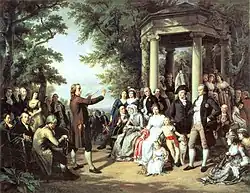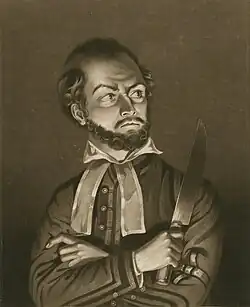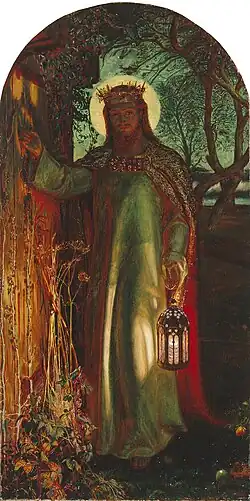Table Talk (Coleridge)
Specimens of the Table Talk of S. T. Coleridge is a collection of Samuel Taylor Coleridge's occasional discourse, edited by his nephew Henry Nelson Coleridge and published in two volumes in 1835.
Quotes

- Schiller has the material sublime.
- 29 December 1822
- Plagiarists are always suspicious of being stolen from, — as pickpockets are observed commonly to walk with their hands in their breeches' pockets.
- 4 January 1823

- Kean is original; but he copies from himself. His rapid descents from the hyper-tragic to the infra-colloquial, though sometimes productive of great effect, are often unreasonable. To see him act, is like reading Shakespeare by flashes of lightning. I do not think him thorough-bred gentleman enough to play Othello.
- 17 April 1823
- The Earth with its scarred face is the symbol of the Past; the Air and Heaven, of Futurity.
- 2 June 1824
- Hamlet's character is the prevalence of the abstracting and generalizing habit over the practical. He does not want courage, skill, will, or opportunity; but every incident sets him thinking; and it is curious, and at the same time strictly natural, that Hamlet, who all the play seems reason itself, should he impelled, at last, by mere accident to effect his object. I have a smack of Hamlet myself, if I may say so.
- 24 June 1827
- I wish our clever young poets would remember my homely definitions of prose and poetry; that is, prose = words in their best order; poetry = the best words in the best order.
- 12 July 1827
- The Reformation in the sixteenth century narrowed Reform. As soon as men began to call themselves names, all hope of further amendment was lost.
- 21 July 1827
- The man's desire is for the woman; but the woman's desire is rarely other than for the desire of the man.
- 23 July 1827
- Painting is the intermediate somewhat between a thought and a thing.
- 30 August 1827
- Poetry is certainly something more than good sense, but it must be good sense at all events; just as a palace is more than a house, but it must be a house, at least.
- 9 May 1830
- That passage is what I call the sublime dashed to pieces by cutting too close with the fiery four-in-hand round the corner of nonsense.
- 9 May 1830
- The book of Job is pure Arab poetry of the highest and most antique cast.
- 9 May 1830
- Shakespeare is the Spinosistic deity — an omnipresent creativeness. Milton is the deity of prescience; he stands ab extra, and drives a fiery chariot and four, making the horses feel the iron curb which holds them in. Shakspeare's poetry is characterless; that is, it does not reflect the individual Shakspeare; but John Milton himself is in every line of the Paradise Lost. Shakspeare's rhymed verses are excessively condensed, — epigrams with the point every where; but in his blank dramatic verse he is diffused, with a linked sweetness long drawn out.
- 12 May 1830
- The present system of taking oaths is horrible. It is awfully absurd to make a man invoke God's wrath upon himself, if he speaks false; it is, in my judgment, a sin to do so.
- 25 May 1830
- The Pilgrim's Progress is composed in the lowest style of English, without slang or false grammar. If you were to polish it, you would at once destroy the reality of the vision. For works of imagination should be written in very plain language; the more purely imaginative they are the more necessary it is to be plain.
- 31 May 1830
- Party men always hate a slightly differing friend more than a downright enemy.
- June 7, 1830
- Intense study of the Bible will keep any writer from being vulgar, in point of style.
- June 14, 1830
- He told me that facts gave birth to, and were the absolute ground of, principles; to which I said, that unless he had a principle of selection, he would not have taken notice of those facts upon which he grounded his principle. You must have a lantern in your hand to give light, otherwise all the materials in the world are useless, for you cannot find them; and if you could, you could not arrange them.
- 21 September 1830
- A poet ought not to pick nature's pocket: let him borrow, and so borrow as to repay by the very act of borrowing. Examine nature accurately, but write from recollection; and trust more to your imagination than to your memory.
- 22 September 1830
- In politics, what begins in fear usually ends in folly.
- October 5, 1830
- If men could learn from history, what lessons it might teach us! But passion and party blind our eyes, and the light which experience gives is a lantern on the stern, which shines only on the waves behind us!
- 18 December 1831
- The truth is, a great mind must be androgynous.
- 1 September 1832

- In the treatment of nervous cases, he is the best physician who is the most ingenious inspirer of hope.
- 2 January 1833
- You talk about making this article cheaper by reducing its price in the market from 8 d. to 6 d. But suppose, in so doing, you have rendered your country weaker against a foreign foe; suppose you have demoralized thousands of your fellow-countrymen, and have sown discontent between one class of society and another, your article is tolerably dear, I take it, after all.
- 17 March 1833
- The principle of the Gothic architecture is infinity made imaginable. It is no doubt a sublimer effort of genius than the Greek style; but then it depends much more on execution for its effect.
- 29 June 1833
- I am glad you came in to punctuate my discourse, which I fear has gone on for an hour without any stop at all.
- 29 June 1833
- The true key to the declension of the Roman empire — which is not to be found in all Gibbon's immense work — may be stated in two words: — the imperial character overlaying, and finally destroying, the national character. Rome under Trajan was an empire without a nation.
- 15 August 1833
- Brute animals have the vowel sounds; man only can utter consonants.
- 20 August 1833
- I am never very forward in offering spiritual consolation to any one in distress or disease. I believe that such resources, to be of any service, must be self-evolved in the first instance. I am something of the Quaker's mind in this, and am inclined to wait for the spirit.
- 20 August 1833
- Farce may often border on tragedy; indeed, farce is nearer tragedy in its essence than comedy is.
- 20 August 1833

- If a man is not rising upwards to be an angel, depend upon it, he is sinking downwards to be a devil. He cannot stop at the beast. The most savage of men are not beasts; they are worse, a great deal worse.
- 30 August 1833
- Dryden's genius was of that sort which catches fire by its own motion; his chariot wheels get hot by driving fast.
- 1 November 1833
- I have known books written on Tolerance, the proper title of which would be — intolerant or intolerable books on tolerance. Should not a man who writes a book expressly to inculcate tolerance learn to treat with respect, or at least with indulgence, articles of faith which tens of thousands ten times told of his fellow-subjects or his fellow-creatures believe with all their souls, and upon the truth of which they rest their tranquillity in this world, and their hopes of salvation in the next, — those articles being at least maintainable against his arguments, and most certainly innocent in themselves?
- 3 January 1834
- I am by the law of my nature a reasoner. A person who should suppose I meant by that word, an arguer, would not only not understand me, but would understand the contrary of my meaning. I can take no interest whatever in hearing or saying any thing merely as a fact — merely as having happened. It must refer to something within me before I can regard it with any curiosity or care. My mind is always energic — I don't mean energetic; I require in every thing what, for lack of another word, I may call propriety, — that is, a reason why the thing is at all, and why it is there or then rather than elsewhere or at another time.
- 1 March 1834
- I take unceasing delight in Chaucer. His manly cheerfulness is especially delicious to me in my old age. How exquisitely tender he is, and yet how perfectly free from the least touch of sickly melancholy or morbid drooping! The sympathy of the poet with the subjects of his poetry is particularly remarkable in Shakspeare and Chaucer; but what the first effects by a strong act of imagination and mental metamorphosis, the last does without any effort, merely by the inborn kindly joyousness of his nature. How well we seem to know Chaucer! How absolutely nothing do we know of Shakspeare!
- 15 March 1834
- Those who argue that England may safely depend upon a supply of foreign corn, if it grow none or an insufficient quantity of its own, forget that they are subjugating the necessaries of life itself to the mere luxuries or comforts of society. Is it not certain that the price of corn abroad will be raised upon us as soon as it is once known that we must buy?—and when that fact is known, in what sort of a situation shall we be?
- 3 May 1834; 'Corn Laws'
- No state can be such properly, which is not self-subsistent at least; for no state that is not so, is essentially independent. The nation that cannot even exist without the commodity of another nation, is in effect the slave of that other nation.
- 20 June 1834; 'Corn Laws—Modern Political Economy'
- I am dying, but without expectation of a speedy release. Is it not strange that very recently by-gone images, and scenes of early life, have stolen into my mind, like breezes blown from the spice-islands of Youth and Hope — those twin realities of this phantom world! I do not add Love, — for what is Love but Youth and Hope embracing, and so seen as one? I say realities; for reality is a thing of degrees, from the Iliad to a dream.
- 10 July 1834
External links
- Specimens of the Table Talk of the Late Samuel Taylor Coleridge (New York: Harper & Bros., 1835)
- Specimens of the Table Talk of Samuel Taylor Coleridge, 2nd ed. (London: John Murray, 1836)